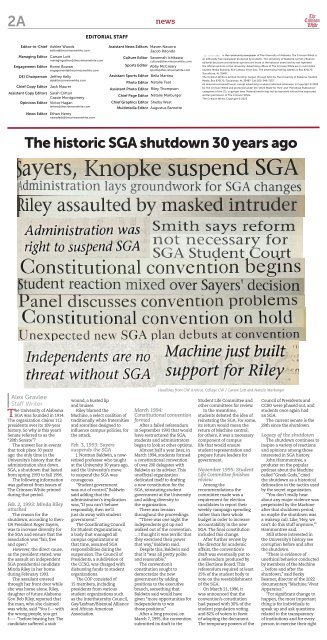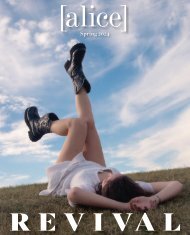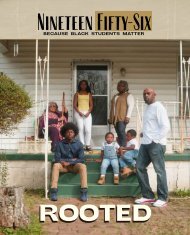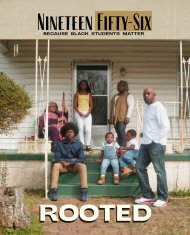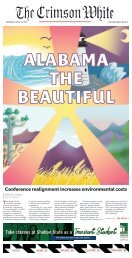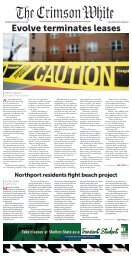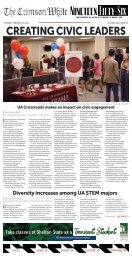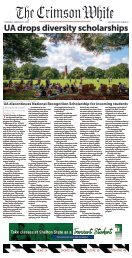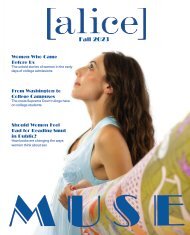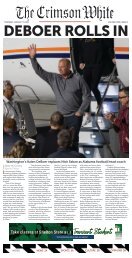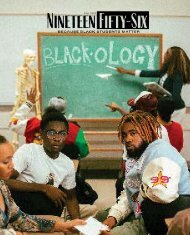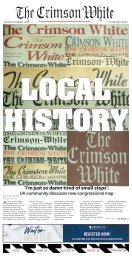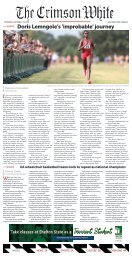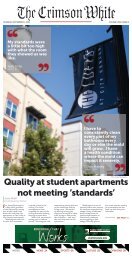The Crimson White Print Edition - September 7, 2023
Create successful ePaper yourself
Turn your PDF publications into a flip-book with our unique Google optimized e-Paper software.
2A<br />
news<br />
EDITORIAL STAFF<br />
Editor-in-Chief<br />
Managing Editor<br />
Engagement Editor<br />
DEI Chairperson<br />
Chief Copy Editor<br />
Assistant Copy Editors<br />
Opinions Editor<br />
News Editor<br />
Ashlee Woods<br />
editor@thecrimsonwhite.com<br />
Carson Lott<br />
managingeditor@thecrimsonwhite.com<br />
Ronni Rowan<br />
engagement@thecrimsonwhite.com<br />
Jeffrey Kelly<br />
dei@thecrimsonwhite.com<br />
Jack Maurer<br />
Sarah Clifton<br />
Cassie Montgomery<br />
Victor Hagan<br />
letters@thecrimsonwhite.com<br />
Ethan Henry<br />
newsdesk@thecrimsonwhite.com<br />
Assistant News Editors Maven Navarro<br />
Jacob Ritondo<br />
Culture Editor Savannah Ichikawa<br />
culture@thecrimsonwhite.com<br />
Sports Editor Abby McCreary<br />
sports@thecrimsonwhite.com<br />
Assistant Sports Editor Bella Martina<br />
Photo Editor Natalie Teat<br />
Assistant Photo Editor Riley Thompson<br />
Chief Page Editor Natalie Marburger<br />
Chief Graphics Editor Shelby West<br />
Multimedia Editor Augustus Barnette<br />
<strong>The</strong> <strong>Crimson</strong> Wh is the community newspaper of <strong>The</strong> University of Alabama. <strong>The</strong> <strong>Crimson</strong> <strong>White</strong> is<br />
an editorially free newspaper produced by students. <strong>The</strong> University of Alabama cannot influence<br />
editorial decisions and editorial opinions are those of the editorial board and do not represent<br />
the official opinions of the University. Advertising offices of <strong>The</strong> <strong>Crimson</strong> <strong>White</strong> are in room 1014,<br />
Student Media Building, 414 Campus Drive East. <strong>The</strong> advertising mailing address is Box 870170,<br />
Tuscaloosa, AL 35487.<br />
<strong>The</strong> <strong>Crimson</strong> <strong>White</strong> is printed monthly, August through April by <strong>The</strong> University of Alabama, Student<br />
Media, Box 870170, Tuscaloosa, AL 35487. Call 205-348-7257.<br />
All material contained herein, except advertising or where indicated otherwise, is Copyright © <strong>2023</strong><br />
by <strong>The</strong> <strong>Crimson</strong> <strong>White</strong> and protected under the “Work Made for Hire” and “Periodical Publication”<br />
categories of the U.S. copyright laws. Material herein may not be reprinted without the expressed,<br />
written permission of <strong>The</strong> <strong>Crimson</strong> <strong>White</strong>.<br />
<strong>The</strong> <strong>Crimson</strong> <strong>White</strong>, Copyright © <strong>2023</strong><br />
<strong>The</strong> historic SGA shutdown 30 years ago<br />
Alex Gravlee<br />
Staff Writer<br />
<strong>The</strong> University of Alabama<br />
SGA was founded in 1914.<br />
<strong>The</strong> organization claims 112<br />
presidents over its 109-year<br />
history. So why is this year’s<br />
Senate referred to as the<br />
“28th Senate”?<br />
<strong>The</strong> answer lies in events<br />
that took place 30 years<br />
ago: the only time in the<br />
University’s history that the<br />
administration shut down<br />
SGA, a shutdown that lasted<br />
from spring 1993 to fall 1996.<br />
<strong>The</strong> following information<br />
was gathered from issues of<br />
<strong>The</strong> <strong>Crimson</strong> <strong>White</strong> printed<br />
during that period.<br />
Feb. 2, 1993: Minda Riley<br />
attacked<br />
<strong>The</strong> reason for the<br />
shutdown, according to then-<br />
UA President Roger Sayers,<br />
was to increase diversity for<br />
the SGA and ensure that the<br />
association was “fair, free<br />
and open.”<br />
However, the direct cause,<br />
as the president stated, was<br />
the assault on independent<br />
SGA presidential candidate<br />
Minda Riley in her home<br />
during February 1993.<br />
<strong>The</strong> assailant entered<br />
through her front door while<br />
she was home alone. Riley,<br />
daughter of future Alabama<br />
Gov. Bob Riley, reported that<br />
the man, who she claimed<br />
was white, said “You f--- with<br />
the wrong people, you get<br />
f-----” before beating her. <strong>The</strong><br />
candidate suffered a stab<br />
wound, a busted lip<br />
and bruises.<br />
Riley blamed the<br />
Machine, a select coalition of<br />
traditionally white fraternities<br />
and sororities designed to<br />
influence campus policies, for<br />
the attack.<br />
Feb. 3, 1993: Sayers<br />
suspends the SGA<br />
J. Norman Baldwin, a nowretired<br />
professor who taught<br />
at the University 30 years ago,<br />
said the University’s move<br />
to suspend the SGA was<br />
courageous.<br />
“Student government<br />
was out of control,” Baldwin<br />
said adding that the<br />
administration's implication<br />
was, “If you can’t behave<br />
responsibly, then we’ll<br />
just do away with student<br />
government.”<br />
<strong>The</strong> Coordinating Council<br />
for Student Organizations,<br />
a body that managed all<br />
campus organizations at<br />
that time, assumed SGA<br />
responsibilities during the<br />
suspension. <strong>The</strong> Council of<br />
Presidents, a subdivision of<br />
the CCSO, was charged with<br />
disbursing funds to student<br />
organizations.<br />
<strong>The</strong> COP consisted of<br />
15 members, including<br />
presidents from various<br />
student organizations such<br />
as the Interfraternity Council,<br />
Gay/Lesbian/Bisexual Alliance<br />
and African American<br />
Association.<br />
Headlines from CW Archive. Collage CW / Carson Lott and Natalie Marburger<br />
March 1994:<br />
Constitutional convention<br />
formed<br />
After a failed referendum<br />
in <strong>September</strong> 1993 that would<br />
have restructured the SGA,<br />
students and administrators<br />
began to look at other options.<br />
Almost half a year later, in<br />
March 1994, students formed<br />
a constitutional convention<br />
of over 200 delegates with<br />
Baldwin as its adviser. This<br />
unofficial organization<br />
dedicated itself to drafting<br />
a new constitution for the<br />
SGA, reinstating student<br />
government at the University<br />
and adding diversity to<br />
the organization.<br />
<strong>The</strong>re was tension<br />
throughout the proceedings.<br />
“<strong>The</strong>re was one night the<br />
independents got up and<br />
walked out of the convention.<br />
... I thought it was terrific that<br />
they exercised their power<br />
that way,” Baldwin said.<br />
Despite this, Baldwin said<br />
that it “was all pretty polite<br />
and reasonable.”<br />
<strong>The</strong> convention’s<br />
constitution sought to<br />
democratize the new<br />
government by adding<br />
positions to the executive<br />
branch, something that<br />
Baldwin said would have<br />
given “more opportunities for<br />
independents to win<br />
those positions.”<br />
After a long process, on<br />
March 7, 1995, the convention<br />
submitted its draft to the<br />
Student Life Committee and<br />
other committees for review.<br />
In the meantime,<br />
students debated the idea of<br />
reinstating the SGA. For some,<br />
its return would mean the<br />
return of Machine control;<br />
for others, it was a necessary<br />
component of campus<br />
life that would ensure<br />
student representation and<br />
prepare future leaders for<br />
government.<br />
November 1995: Student<br />
Life Committee finishes<br />
review<br />
Among the<br />
recommendations the<br />
committee made was a<br />
requirement for election<br />
candidates to report their<br />
weekly campaign spending<br />
rather than their whole<br />
budget in order to increase<br />
accountability in the new<br />
SGA. <strong>The</strong> final constitution<br />
included this change.<br />
After further review by<br />
the director for academic<br />
affairs, the convention’s<br />
draft was eventually put to<br />
a referendum produced by<br />
the Elections Board. This<br />
referendum required at least<br />
25% of the student body to<br />
vote on the reestablishment<br />
of the SGA.<br />
On March 21, 1996, it<br />
was announced that the<br />
convention’s constitution<br />
had passed with 30% of the<br />
student population voting<br />
and 82% of voters in favor<br />
of adopting the document.<br />
<strong>The</strong> temporary powers of the<br />
Council of Presidents and<br />
CCSO were phased out, and<br />
students once again had<br />
an SGA.<br />
<strong>The</strong> current senate is the<br />
28th since the shutdown.<br />
Legacy of the shutdown<br />
<strong>The</strong> shutdown continues to<br />
inspire a variety of reactions<br />
and opinions among those<br />
interested in SGA history.<br />
John Hammontree, a<br />
producer on the popular<br />
podcast about the Machine<br />
called “Greek Gods,” cited<br />
the shutdown as a historical<br />
delineation in the tactics used<br />
by the secret organization.<br />
“You don’t really hear<br />
about any major violence was<br />
perpetrated by the Machine<br />
after that shutdown period,<br />
so maybe the shutdown was<br />
a wakeup call. Like, ‘Hey, we<br />
can’t do this stuff anymore,’”<br />
Hammontree said.<br />
Still others interested in<br />
the University’s history see<br />
corruption before and after<br />
the shutdown.<br />
“<strong>The</strong>re is evidence of<br />
unethical behavior conducted<br />
by members of the Machine<br />
... before and after the<br />
shutdown,” said Becky<br />
Beamer, director of the 2022<br />
documentary “Machine: Vivat<br />
Apparatus.”<br />
“For significant change to<br />
happen, the most important<br />
thing is for individuals to<br />
speak up and ask questions<br />
related to the transparency<br />
of institutions and for every<br />
person to exercise their right


